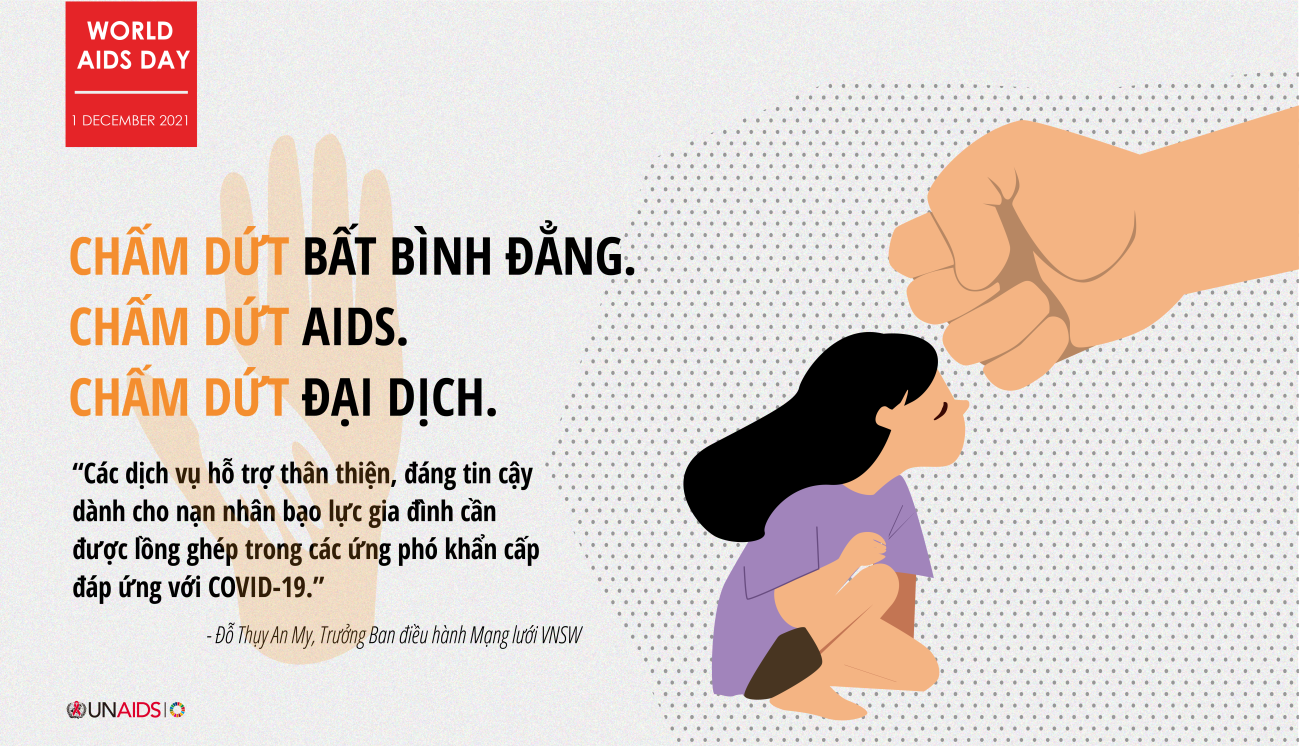This pair of eyes belongs to Hien (not her real name), a 30-something-year-old female sex worker living with her husband and two small children.
The family moved from Kien Giang province to Ho Chi Minh City 8 years ago. Working in a karaoke bar and selling sex, Hien’s income was much higher than her husband who occasionally took some seasonal jobs before the COVID19 pandemic. In order to get more clients, she arrived at the bar in the early morning and worked till late evening every day. So her husband bore the responsibility of taking care of the children at home. In the afternoon, he often drank and hung out with friends at the street sidebars.
As a COVID-19 recurring wave hit Viet Nam in 2021, all the entertainment establishments closed. Hien lost her source of income. Their meager saving was used up. Her husband’s alcoholism got severe. Compounding stress caused by income loss, her husband struck her and her children just as the lockdown started.
“As I did not have money for him to buy alcohol, he shoved, punched, and slapped me.”, Hien shared, “He scolded me and insulted me as a sex worker. I kept silent, as I didn’t want my little kids to know my job.”
Violence escalated as her husband managed to get alcohol to drink, usually in the afternoons. Hien was intimidated and lingered in the lane where her house is located and with neighbors in order to avoid him. However, at night, violent acts continued behind the door.
Domestic abuse spiked during COVID-19. Gender-based and sexual violence most often is perpetrated by someone a survivor knows, and this includes intimate partners. Hien’s story was unveiled by a member of the Viet Nam Network of Self-help Groups Supporting Sex Workers (VNSW) who spotted her black eyes when disseminating the UNAIDS-funded COVID-19 daily necessities emergency package.
Worrying that no one would take care of two small children if she goes back to full-time work later, Hien endured the domestic violence in silence throughout the 4-month lockdown. More importantly, she is not aware of where and how to get help.
“In the pandemic, female sex workers become an easy target during the prolonged stay-at-home time with compound stress from loss of livelihoods. User-friendly and trustworthy services for domestic violence victims should be incorporated in the emergency COVID-19 response and become more easily accessible. The health and social services should be inclusive, remain open and accessible without stigma and judgment.”, said Ms. Do Thuy An My, chairwoman of VNSW.
Many sex workers like Hien are living under the shadow of violence in silence. Self-stigmatization of sex workers impacts their ability to seek help.
Collaborative efforts must develop the safety net for all women and girls. Government plays a pivotal role in guaranteeing all women and girls can access health and social services, accommodation, legal services, and protection from violence. Communities should be fueled with resources to provide timely and user-friendly support services to respond to different forms of gender-based violence. Every effort matters to put an end to gender-based violence.
If you or someone you know needs help, you can call <094 140 9119> to report any cases of gender-based violence. All information will be confidential.
Reference
UNAIDS (2020). Six concrete measures to support women and girls in all their diversity in the context of the covid-19 pandemic. Accessed from https://www.unaids.org/sites/default/files/media_asset/women-girls-covid19_en.pdf
WHO (2002). World report on violence and health
http://apps.who.int/iris/bitstream/handle/10665/42495/9241545615_eng.pdf;jsessionid=53B91BBF0185D8675E49A057DC5C45FC?sequence=1




